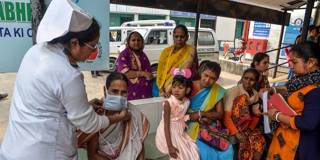 Diptendu Dutta/AFP via Getty Images
Diptendu Dutta/AFP via Getty Images
全球大流行应对措施的缺漏
华盛顿特区—2019冠状病毒病在发达国家肆虐之后,现在正在摧毁发展中国家和新兴市场国家,其中大多数国家缺乏医疗和财政能力来抗击这一流行病及其产生的经济影响。
对于发达经济体来说,第一道防线是保持社交距离、洗手、戴口罩和大范围封锁。但对于较贫穷的国家来说,复制这种应对方式几乎是不可能的。住房往往过于拥挤,口罩和肥皂稀缺。此外,水源和卫生设施往往是公用的,并位于狭窄的小巷中,许多穷人必须每天离开家园才能获得水源、使用卫生设施或购买食物。因此,对那些仅能糊口的穷人来说,强制封锁政策相当于让他们陷入贫困,还有可能导致饥饿。
印度许多地区的情况表明,这场灾难正在发展中国家和新兴市场蔓延。当印度总理纳伦德拉·莫迪(Narendra Modi)在3月底突然宣布实行封锁时,数百万移民失去了工作,被迫返回数百英里外的村庄。在没有交通工具的情况下,他们只能步行,沿途传播病毒。
https://prosyn.org/uYYCMLOzh
To continue reading, register now. It’s free!
Register Now
Already have an account?
Log in



华盛顿特区—2019冠状病毒病在发达国家肆虐之后,现在正在摧毁发展中国家和新兴市场国家,其中大多数国家缺乏医疗和财政能力来抗击这一流行病及其产生的经济影响。
对于发达经济体来说,第一道防线是保持社交距离、洗手、戴口罩和大范围封锁。但对于较贫穷的国家来说,复制这种应对方式几乎是不可能的。住房往往过于拥挤,口罩和肥皂稀缺。此外,水源和卫生设施往往是公用的,并位于狭窄的小巷中,许多穷人必须每天离开家园才能获得水源、使用卫生设施或购买食物。因此,对那些仅能糊口的穷人来说,强制封锁政策相当于让他们陷入贫困,还有可能导致饥饿。
印度许多地区的情况表明,这场灾难正在发展中国家和新兴市场蔓延。当印度总理纳伦德拉·莫迪(Narendra Modi)在3月底突然宣布实行封锁时,数百万移民失去了工作,被迫返回数百英里外的村庄。在没有交通工具的情况下,他们只能步行,沿途传播病毒。